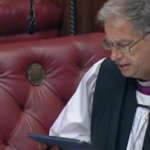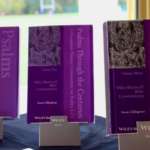A Sermon for the Civic Service of Thanksgiving marking the end of St Mary’s Festival 200
St Mary’s Banbury
23 October, 2022.
“We have gifts according to the grace given to us – each of us different gifts”
It’s a delight to be in Banbury this morning for this civic service to mark the end of Festival 200. Warm congratulations on all that’s been achieved through the Festival in challenging times. Happy 200th birthday to St. Mary’s. I hope its been a good party and celebration and a great springboard for the next one hundred years here.
I’ve spent most of this week in Parliament and it’s good to be focussed this morning on the life of a local community, the creativity of its people and the life of the local church. Thanks be to God. By all means ask me about that later.
Our first reading begins with three extraordinary words and an extraordinary claim which I guess have been at the heart of Festival 200. The words are these: we have gifts. We have gifts – each of us – graces from God. We all have different gifts and the passage goes to to speak of some of them: prophecy and teaching and leadership and cheerfulness. But my emphasis this morning is not really on the different gifts. I just want to explore those three words: we have gifts and reflect on how true those words are.
Some of those gifts have been celebrated all the way through this festival in music and creative writing and the visual arts: a feast of creativity.
It is a vital truth and one worth remembering. Christians believe that every person is loved and special, created by God. Christians believe that every person is given gifts. Gifts and talents are not just distributed to a few people but to everyone for the service of all. Humankind flourishes when all those gifts are affirmed and released and enjoyed for the good of all.
Just that one truth shapes the Christian view of the arts: creating space for people to express themselves and try new things. That one truth shapes the Christian view of education: it is not about the education of an elite but high quality education for all. It shapes the Christian view of vocation: encouraging everyone to find their calling according to their talents. It shapes the Christian view of the Church: a place where different parts of the body exercise different ministries for the building up of the whole. We have gifts.
Where do those gifts come from? There are two answers. We need to go back a few verses in the passage for the first one and even further back for the second.
Gifts come first from lives which are dedicated to God’s service. I appeal to you to present your bodies as a living sacrifice, writes Paul. Offer your life and all your gifts to God who made you and loves you and saves you in Jesus Christ. Allow yourself to be washed on the inside and changed and made new. Offer your gifts not in pride but in humility: don’t think of yourself more highly than you ought to think. Everything you have is a gift from God. Offer it back to God in love and service and see the offering of your gift as a prayer, a sacred calling, your spiritual worship: whether that is textiles, or painting, or caring for your family or leading a school.
But there is a deeper answer still to that question where do your gifts come from. According to Romans and to Acts, they come from God’s greatest gift, the gift of the Holy Spirit.
The Book of Acts describes how Jesus’ disciples are all gathered in the Upper Room, fifty days after the resurrection at Pentecost. The room is filled with the sound of a rushing mighty wind. Tongues of fire come and settle over each and they begin to speak in new languages.
The Spirit of God comes to dwell in the heart and mind and life of the disciple. The Spirit comes to kindle into life the gifts which are latent within us, to set our hearts on fire. The Spirit comes to bring new and extraordinary gifts for the ministry to which God calls us through the arts or through music, through practical service, through our giving, through compassion.
The Spirit’s life within us is like a bubbling spring, says Jesus, a spring that wells up inside us. Life can feel sometimes as though we are living in a parched desert: everything is fragile; everything is hard. Those are the moments to look within and find that living bubbling spring in the heart of every Christian which quenches our deepest thirst and then gives life to the world.
We have gifts according to the grace given to us. You are an amazing community. Look how much life and creativity has been birthed through this festival and how many people have been blessed.
The end of the Festival is a moment for two invitations. The first is an invitation for those outside the Church whose hearts have been stirred to come deeper. Come and explore this extraordinary and wonderful God who gives gifts to everyone, who transforms lives, who enables strangers to become friends and who rebuilds communities in love when they break down. Come and receive the Holy Spirit who will restore your energy and confidence and vision and release the gifts you have in the service of others.
The second invitation is to those who have worked long and hard in this festival to celebrate the gifts of others. The second invitation is an invitation to rest now for a while. The Spirit works in seasons of fruitfulness and seasons of resting in the vine. Don’t be afraid to do nothing for a little while. To rest in God’s love. To allow strength to return for a new season of celebration and creativity and who knows, a new festival in due course.
We face so many challenges in our local communities, in our nation and in the world. But God has given gifts to each of us according to his grace, and most of all the precious gift of the Holy Spirit, a bubbling spring of life eternal to renew God’s world. Amen.

![Bishop_Steven_at_St_Marys_Banbury[1]](https://blogs.oxford.anglican.org/wp-content/uploads/2022/10/Bishop_Steven_at_St_Marys_Banbury1-1500x430.jpg)

